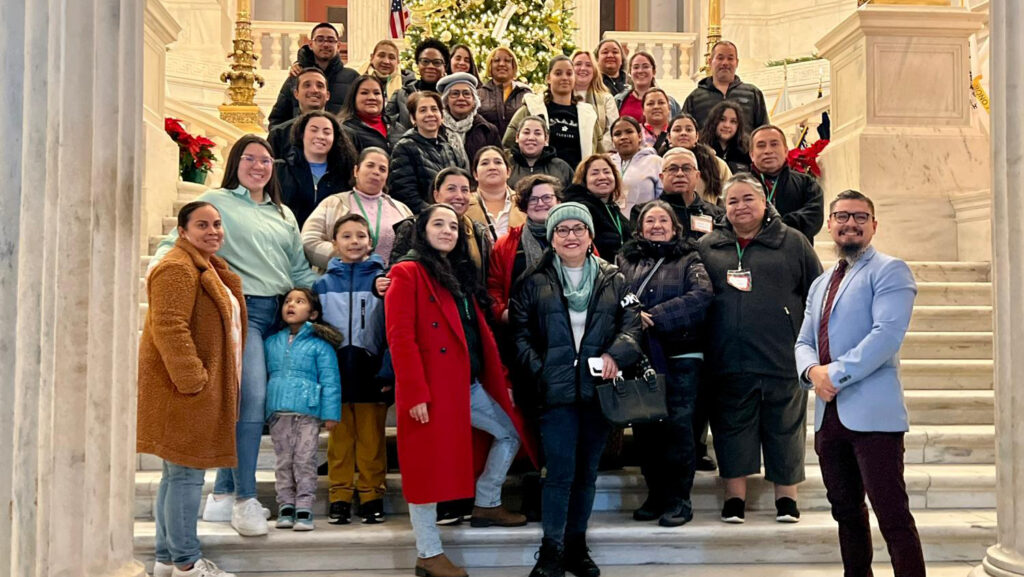Nuevas Voces Tours Rhode Island State House and Hosts Mock Legislative Session Green Infrastructure and Public Transit
On a windy and gloomy night, the current Nuevas Voces (New Voices) cohort embarked on an enlightening visit to the Rhode Island State House. For many participants, this was their first time exploring the historic building. The evening began with a guided tour facilitated by the Secretary of State’s office, with translation provided by Haley Essington from WRWC’s Community Programs Department. The tour included stops at several significant locations within the State House, such as the library, the Charter Museum, the Senate chamber, and the State Room. The tour concluded in the House chamber, where participants engaged in a lively and thought-provoking mock legislative debate.
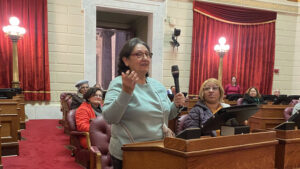
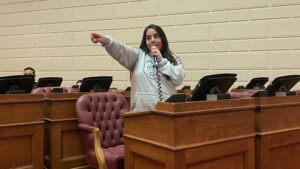
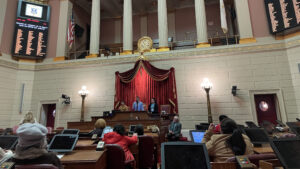
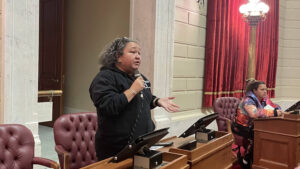
Debating for a Sustainable Future
The mock debate focused on legislative topics related to public transportation and green infrastructure. Building on knowledge gained during the December class on the local legislative process—a class led by WRWC’s Community Programs Director, State Representative David Morales and Providence City Councilor Miguel Sanchez—participants debated policies addressing environmental justice and climate change. This mock debate offered participants a hands-on opportunity to apply their understanding of these critical issues.
During the debate, the cohort “passed” two mock bills advocating for:
- Making RIPTA (Rhode Island Public Transit Authority) services free and accessible to all by increasing the state’s per-gallon gas tax.
- Requiring new commercial and residential developments to invest funds towards the planting of trees, supporting community gardens, and other green infrastructure projects.
Empowering Advocacy Through Leadership
Nuevas Voces is more than just a program; it is a movement of empowering residents from riverfront neighborhoods in Central Providence to advocate for environmental justice. These neighborhoods face acute challenges, including public health disparities, stormwater and flooding issues, transportation barriers, toxic exposures, and extreme heat.
By centering residents’ aspirations and concerns, Nuevas Voces fosters co-governance between community members, municipal and state agencies, environmental coalitions, and other groups. Participants work to ensure that their most affected neighbors have the greatest influence over community development, resource allocation, and emergency preparedness at every level—including within WRWC’s own initiatives.
Comprehensive Support for Resident Leaders
Nuevas Voces consists of a 10-month advocacy training and empowerment program delivered in Spanish, supplemented by monthly classes featuring guest speakers and site visits. To remove barriers of participation, WRWC provides financial compensation, childcare, and transportation to participants. Alumni of the program have gone on to lead Nuevas Voces, sit on WRWC’s board, and hold compensated positions on municipal and state commissions, committees, and boards.
A Model for Environmental Justice
The recent visit to the State House and the mock debate are examples of how Nuevas Voces equips residents with the tools and knowledge to advocate for their communities effectively. By combining education, leadership training, and direct action, Nuevas Voces ensures that residents are not only heard, but also empowered to drive meaningful change.
Through initiatives like these, Nuevas Voces continues to build a network of advocates who are reshaping their neighborhoods into healthier, more equitable, and climate-resilient communities—one policy and one leader at a time.

